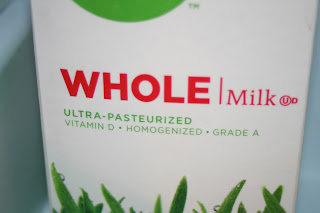I had long ago read that if you could only afford to buy your family one organic grocery, make it milk. Kids just consume so much of it, and making an organic choice ensures that the milk in their cereal is both antibiotic- and synthetic-growth-hormone-free. This may seem bad, but the stuff is so expensive that I switched only the kids' milk to organic. I guess I figured that for John and I the damage had already been done; after all we've been drinking our hormones for decades.
But, my most recent reading has given me even more to think about when it comes to milk choices. Since we began looking into the purchase of dairy goats, I've become more aware of the debate surrounding raw vs. pasteurized milk. Most people prefer the safety of pasteurized milk. I guess this is why the "Ultra-Pasteurized" label on our milk cartons won't even give most of us pause. If pasteurized is good, then ultra-pasteurized must be even better, right?
The cheesemaking book I'm reading first introduced me to the problems with ultra-pasteurized (UP) milk. Sometimes labeled as UHT, ultra-high temperature, this milk has reached temperatures of at least 280 degrees for at least 2 seconds at some point during processing. That's way hotter than the process used for standard pasteurization. In fact, it's hot enough to break down the milk proteins that make it so good for us. My cheese-making book tells me to avoid this milk for cheesemaking because it is too dead to support the good bacteria growth necessary to produce cheese. It claims that UP milk essentially has the nutrictional value of water. Water?!
Naturally, I went to the refrigerator and checked my labels.
Wouldn't you know it -- the kids' organic milk is ultra-pasteurized! So, I'm essentially paying $3.20 for a half-gallon of milk, and in return providing the kids the same nutrition as if I had just turned on the faucet.
Studies show that ultra-pasteurization does nothing to make our milk safer than standard pasteurization, so why is it even being done? Wouldn't you know it'd be about the bottom line. Ultra-pasteurization gives the milk a must longer shelf life. In fact, unopened, this stuff would keep for months in your pantry. However, marketers quickly discovered that Americans are suspicious of milk that can be purchased unrefrigerated, so they refrigerate it to appease us. Seems like a waste of energy and resources, right?
That's not the only way this is bad for our environment. This process which provides milk a longer shelf life, also allows larger commercial dairies to buy out smaller ones and ship to our supermarkets from longer distances. So, if you make an effort to reduce your environmental impact by purchasing more food generated closer to home, this milk is fighting you every step of the way.
Further research revealed that 80% of organic milk sold in the US is ultra-pasteurized. In fact, to buy standardly pasteurized organic milk, you'll probably have to visit an upscale market. Horizon, for example, actually produces two different varieties. They send an ultra-pasteurized version to most markets and reserve their standard pasteurized product for Whole Foods and similar upscale markets.
So, as consumers what are we to do with all this information? I can fill my kids' glasses with synthetic growth hormones and antibiotics or I can give them "milk" that is so dead that those quotation marks are justified.
Whew! All of this makes me really thankful that we're about to be milking our own dairy goats right in our own backyard.
Antibiotic free? Check.
Growth hormone free? Check.
Locally produced? Check.
Healthy and wholesome? Check!
Don't just take my word for it. Do some research on this for yourself. This website is a great starting point.


I enjoyed your post. I, too, have been researching this issue. I finally found a small farm to buy raw cow's milk from, but in order to buy it legally in Arkansas, I had to buy a cow share, which basically means I own part of the cow and pay the farmer to milk it for me. I have experimented with butter and cheese making with great results. I haven't tried goat's milk, but I hear it doesn't taste that differently from cow's. Good luck!
ReplyDelete